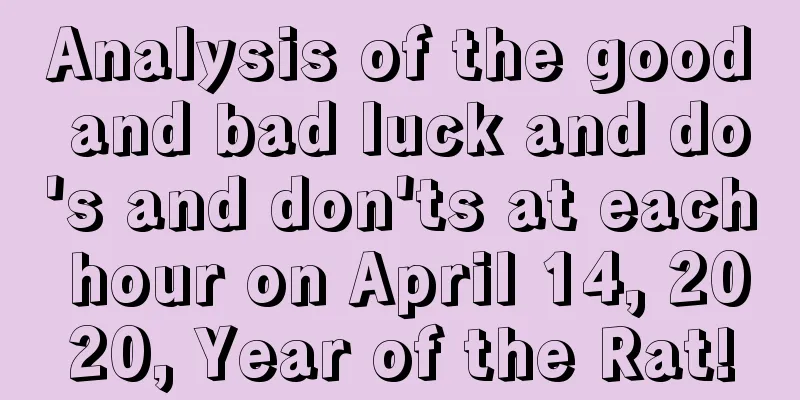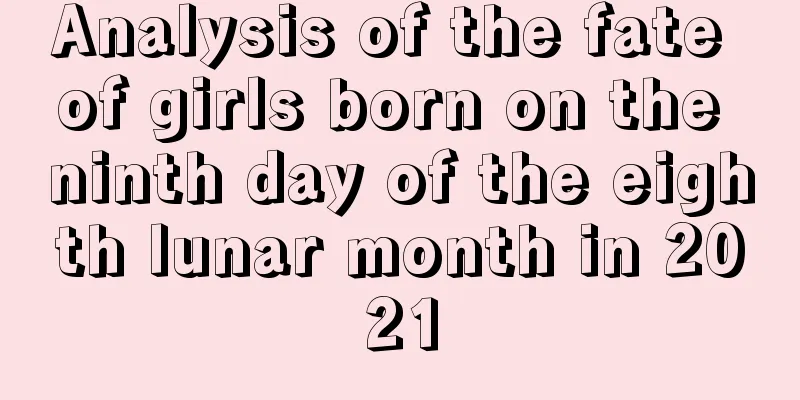What are the taboos and taboos of the Han Chinese New Year?

Because of the differences in ethnic groups, different ethnic groups may have different taboos during the Chinese New Year. So, for the Han people, what are the taboos during the Chinese New Year? New Year, New Atmosphere. If you want to know more about the Lunar New Year, please pay attention to the 2019 Chinese New Year and Spring Festival special article exclusively presented to you by Shui Mo Xiansheng website!What are the taboos during the Han Chinese New Year?1. Commonly known as "New Year's Eve", it is the last day of the previous year. Stay up all night on New Year's Eve. Avoid going to bed too early. Speak auspicious words and avoid bad words. You cannot urinate or defecate on New Year’s Eve. You can only urinate or defecate after seeing the sun. Avoid breaking objects. Breaking bowls, plates, cups and dishes on this day means that you will have "bad luck" in that year. The remedy is to wrap them in red paper, recite auspicious words such as "peace every year" and place them on the altar for a few days to avert the disaster. You can't keep wet clothes during the New Year! It is taboo to encounter funerals, as they are considered unlucky and symbolize that a great disaster will come in the coming year. 2. Avoid breaking bowls, mirrors and other glass or ceramic items on the first day of the Lunar New Year to avoid losing money and fortune. If you break them accidentally, the remedy is to wrap them in red paper, place them on the altar, silently recite the auspicious words "peace every year", and wait until the fifth day after the New Year to discard them. 3. Avoid taking a bath, washing your hair or doing laundry on the morning of New Year's Day to avoid washing away your wealth and fortune. 4. Do not eat porridge, meat or medicine in the morning of New Year's Day. In ancient times, only poor people could not afford rice and had to eat porridge. Eating porridge on New Year's Day will lead to poverty for the whole year. In addition, killing is forbidden on the first day of the Lunar New Year, so it is not suitable to eat meat. As a result, there is a Taiwanese proverb that goes, "Eating vegetables early on the first day of the Lunar New Year is just like eating vegetarian food for a year." Try not to take medicine on the first day of the Lunar New Year. Unless you are seriously ill, it is not suitable for healthy people to take tonics on this day. 5. Avoid taking a nap on the first day of the Lunar New Year. According to the ancient saying "no daytime naps" people are advised not to be lazy. Taking a nap on the first day of the Lunar New Year will affect your career luck. 6. Avoid washing clothes on the first and second day of the Lunar New Year. Legend has it that these two days are the birthdays of the water god, so avoid washing clothes.What customs do the Han people have for celebrating the Spring Festival?1. Burning Door God Paper In the old days, on the third day of the first lunar month, pine and cypress branches from the New Year festival and the door gods and paper hung during the festival would be burned together to indicate that the New Year was over and it was time to start a new life. There is a proverb that goes "After burning the door god paper, you will have trouble finding your own way." 2. Xiaonianchao is also called Tianqing Festival. A court festival in the Song Dynasty. In the first year of Dazhong Xiangfu during the reign of Emperor Zhenzong of Song, it was said that a book from heaven had descended to the earth. So Emperor Zhenzong issued an edict to designate the third day of the first lunar month as Tianqing Festival, and officials were given a five-day holiday. Later it was called Xiaonianchao, and people did not sweep the floor, beg for fire or draw water, just like Suichao. 3. Posting a "Red Mouth" In southern China, people would post a "Red Mouth" (no talking) on the morning of the third day of the Lunar New Year, as it is believed that quarrels are likely to occur on this day and it is not appropriate to pay New Year's greetings. The so-called "red mouth" is usually a red paper strip about seven or eight inches long and one inch wide, with some auspicious words written on it for safe entry and exit (the content has a certain format, for example: "On the third day of the first lunar month in the year of Jiaxu in 1994, when incense is burned in front of the gods, the nails at the front door will be broken, and all men and women will be red-mouthed, thieves will be stolen, and all disasters will be gone. May good luck return to heaven"). It is pasted on the top of the front and back doors, and another piece is placed on the garbage to be taken out and thrown away. 4. “Sending off the Year” A farewell ceremony is usually held at night to send the gods and ancestors back to heaven. 5. Worship the God of Wealth People in the South worship the God of Wealth on the fifth day of the first lunar month. According to folklore, the God of Wealth is the God of Five Roads. The so-called five roads refer to east, west, south, north and center, meaning that you can make money by going out of any of the five roads. |
<<: What does the Beginning of Spring mean? When is the Beginning of Spring in 2019?
Recommend
Is it taboo to repair graves on the sixth day of the twelfth lunar month in 2019, the day before New Year's Day? Feng Shui analysis of repairing graves in Yin houses!
Introduction: Generally, it is necessary to choose...
Can I get engaged on Women’s Day (February 15) in 2020? What are the engagement customs?
Engagement is a ceremony and proof for both partie...
Can I burn incense and pray for blessings on the day before the beginning of winter on October 11, 2019 in the lunar calendar?
The weather in the tenth month of the lunar calend...
What is the appropriate thing to do on the 28th day of the twelfth lunar month, and what are the taboos to avoid on the 28th day of the twelfth lunar month?
Introduction: The preparations for New Year’s good...
When is the beginning of summer in 2017? Is it a good day to get married?
Introduction: Getting married is a happy event for...
Is it a good time to travel on November 25th of the lunar calendar in 2017?
Introduction: The cold wind brings a chilly atmosp...
What is the fate of a baby girl born on the fifth day of the third lunar month in 2019?
What is the fate of a baby girl born on the fifth ...
Is the 15th day of the seventh lunar month in 2021 a good day? Is it suitable for a funeral?
Days can be auspicious or inauspicious, good or ba...
Is it not appropriate to burn incense and pray the day before the beginning of summer in 2020? What should we pay attention to when it rains on the beginning of summer?
Introduction: You need to choose an auspicious day...
Can I move on December 14th, 2021? Do I need to worship the house god after moving?
December at the end of the year is the month when ...
Is it good for a boy born on the sixth day of June in 2020? Is he lucky with noble people?
Introduction: Children born on different days have...
What day is Xiaohan? What's the point?
Minor Cold marks the official start of the winter ...
What is the date of September 15th in the lunar calendar in 2018? Is this day suitable for worshipping ancestors?
Introduction: Sacrifice is a major event, so an au...
Is it possible to move into a new house on the eleventh day of the first lunar month in 2018?
What day is the eleventh day of the first lunar m...
Is July 16, 2020, the first day of the dog days, suitable for groundbreaking and renovation?
Introduction: It is necessary to choose an auspici...









